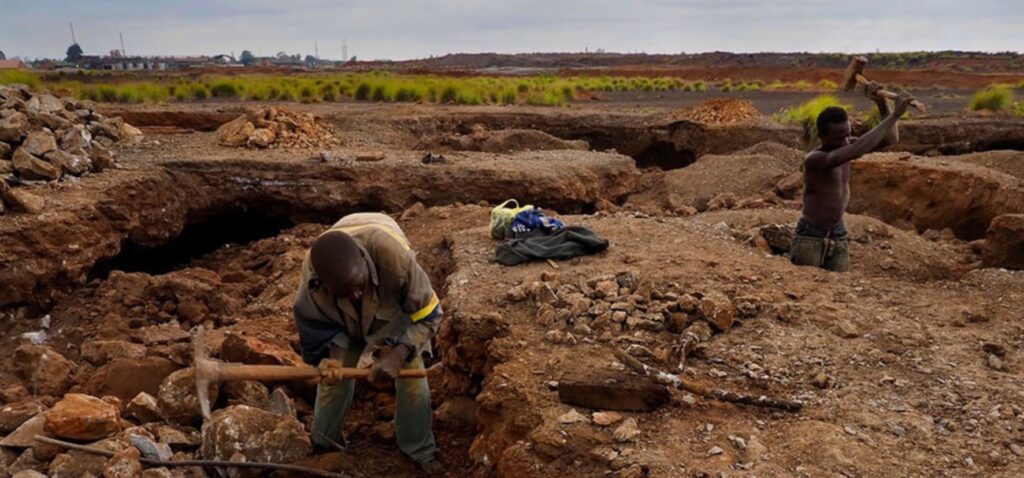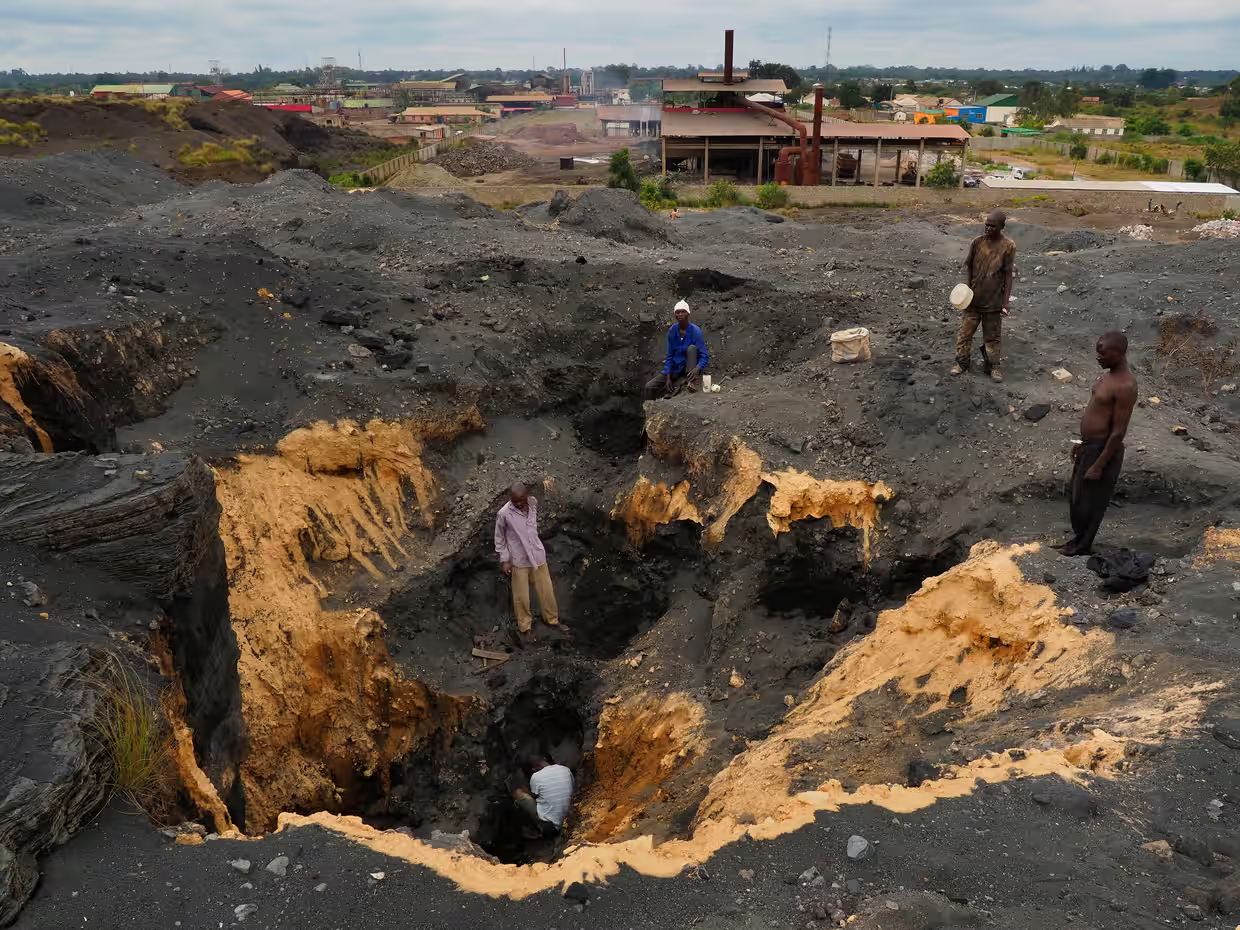By Ennety Munshya
Mining companies extracting zinc from lead waste dumpsites may be reversing years of efforts to remediate lead contamination in Kabwe, a MakanDay investigation has found. These operations are releasing additional lead dust into the air and disturbing compacted soil, worsening the severe pollution that has made Kabwe one of the world’s most polluted towns.
This raise concerns that the minimal progress made by previous cleanup initiatives—including the Kabwe Environmental Project (2003-2007), the ZCCM-IH Environmental Project (2010-2013), and the recently concluded Zambia Mining and Environmental Remediation and Improvement Project (ZMERIP) (2017-2023)—could be undone.
Kabwe, once a bustling hub for lead and zinc mining, is now infamous for its legacy of lead contamination. Throughout much of the 20th century, the town was extensively mined—first by Anglo American and later by Zambia Consolidated Copper Mines (ZCCM)—with little to no precautions taken to prevent harmful metal pollution.
MakanDay has established that most mining companies in Kabwe, including Datong Industries Corporation Limited, Dashun Industries, San He Manufacturing Limited, Union Star Industry Limited, Chengde Mining, and Ferro Alloys Corporation, are owned by Chinese investors.
The new mining activities are exacerbating an already difficult situation by indiscriminately dumping contaminated waste containing high levels of lead and other hazardous materials within local communities, negatively impacting air quality and endangering the health of Kabwe’s residents.
On October 2, 2023, the Central Province administration ordered the closure of all mining activities in Kabwe town, citing health risks associated with the mining operations. However, an investigation by MakanDay Centre for Investigative Journalism revealed that mining activities continue unabated.
Mining is predominantly happening near the former Kabwe mine, particularly in areas like Chowa, which is known as a lead contamination hotspot.

A site inspection by MakanDay in the Mukobeko area, where the Chinese-owned Union Star Industry Limited operates, revealed large piles of toxic waste collected from the Kawasaki dumpsite.
According to Zambia’s Mining Cadastre website, Union Star Industry Limited holds a mineral processing licence and is engaged in processing copper, lead, and zinc.
MakanDay reached out to mining companies in Kabwe to understand what measures they are implementing to minimize environmental pollution from their operations.
Union Star Industry Plant Manager Allison Wei declined to respond to questions, remaining silent during a phone call with a MakanDay journalist.
A representative from Dashun Mine, which shares ownership with Datong, promised to provide the contact of a human resources officer to address MakanDay’s queries. However, this contact has yet to be provided.
These materials are being purchased by the Chinese mining companies from local youths scavenging both the black mountain and Kawasaki dumpsites.
The black mountain site, still under the custody of Jubilee Metals, the licence holder for the former Kabwe mine, has almost been depleted of mine waste. Worryingly, the remaining contaminated material is being moved and dumped in residential areas, exposing local communities to severe health risks.
On September 25, 2024, MakanDay requested an update from the district administration regarding the resumption of mining activities and the measures being implemented to prevent further environmental damage. No response has been received to date.
The ongoing extraction of minerals from toxic mine waste continues to exacerbate soil and air pollution, undoing years of environmental remediation efforts in Kabwe.
Stakeholders speak out
Freeman Mubanga, head of research at the Centre for Environment Justice (CEJ), criticised the government’s inconsistent efforts to address the lead poisoning crisis in Kabwe. He pointed out that the Zambia Mining Environmental Remediation Project (ZMERIP) has failed to make a lasting impact, largely due to unregulated mining activities.
“The lead contamination crisis in Kabwe demands a strategic approach,” Mubanga said, emphasising the need to control both the mine waste and those scavenging for lead and zinc.
Ministry of Mines responds
In response, the Ministry of Mines and Minerals Development reiterated its commitment to safeguarding the environmental progress made so far through the efforts of an inter-ministerial committee. The ministry also pledged that regulatory bodies would enforce compliance within the mining, manufacturing, and extractive industries to prevent further environmental damage.
The legacy of lead contamination in Kabwe highlights the intricate link between environmental degradation and public health, posing ongoing challenges for both the community and policymakers.
Residents speak out on Kabwe’s lead crisis
Florence Mweemba, a student living in Chowa Compound, Kabwe, is calling for decisive government action against the ongoing mining activities in her area, which she believes are worsening the already dire situation. Florence shared her story with MakanDay, explaining how moving from a non-contaminated area to Chowa has severely impacted her health.
“I grew up in a place that wasn’t contaminated by lead. But ever since I moved to Chowa for school, I’ve been experiencing memory loss. I forget things easily, even what I’ve just studied. The lead contamination is really affecting me,” she said.
Another community member, Hellen Phiri, a local trader, expressed concern over the continuous dust emissions from nearby mining operations, which she says are affecting residents’ health.
“The mining activities have continued, and so much dust is being blown into the communities. I think the roads near the mining areas should be tarred to reduce dust emissions,” she suggested. Ms. Phiri also called for additional measures to protect residents from the harmful effects of mining.
“We are advised to drink milk, but we can’t afford to buy it regularly, and that’s why the illnesses never end. The mining companies keep operating and exposing us to dust, yet they offer no support to the community,” she lamented.
Another resident, who preferred to remain anonymous, voiced her concerns about the health of children in the community. She fears for their well-being as they frequently complain of headaches, stomach pains, and high body temperatures—symptoms similar to those reported by former mine workers.
“The current situation in Kabwe is heartbreaking, especially for our children,” she said.
Image credit: The Guardian

Discover more from MAKANDAY
Subscribe to get the latest posts sent to your email.



